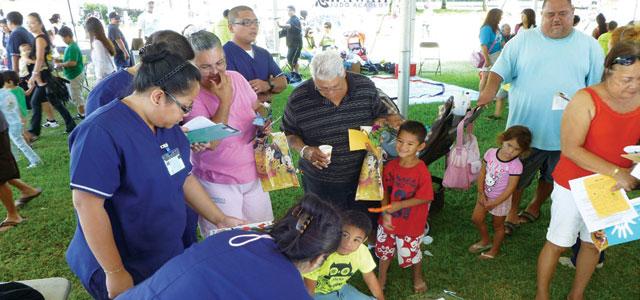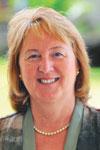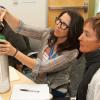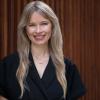
On Children and Youth Day in Honolulu, Chaminade nursing students conduct research and play nutritional games with children and families.
Crafting a 21st Century School of Nursing in Honolulu, Hawaii
Thanks to grants from The Atlantic Philanthropies and a partnership with UCSF School of Nursing, Chaminade University of Honolulu, Hawaii, is building a unique bachelor of science in nursing (BSN) program. Tailored to the needs of native Hawaiians and Pacific Islanders and grounded in the latest research about nursing, teaching and learning, the program will graduate students to help meet a well-documented nurse shortage and address health disparities throughout the Pacific Islands.
A Perfect Confluence
Chaminade decided to pursue its nursing program in 2008 after a nearly decadelong, universitywide revitalization effort and discussions with regional health care providers and prospective students. As planning progressed, Chaminade’s Dean of Natural Sciences and Mathematics Helen Turner met with Kathleen Dracup – at the time still dean of UCSF School of Nursing – to craft a vision that led to their applying for and receiving a pair of $250,000 grants from The Atlantic Philanthropies.
The Atlantic Philanthropies also supports UCSF School of Nursing with two additional grants: $250,000 to strengthen and formalize its relationship with Queensland University of Technology School of Nursing and Midwifery, and a $1,750,000, three-year grant to the UCSF schools of nursing and dentistry to support a partnership with Elev8 Oakland for improving access to school-based health care.
 Dean Stephanie Genz “It was a perfect confluence,” says Stephanie Genz, whom Turner recruited to serve as the school’s first dean. “Chaminade [Hawaii’s only Catholic university] is the right place for a nursing school because the values of Marianist Brothers – caring, integrity, service, community – and nursing values truly align. Working with UCSF, we think something very special has emerged.”
Dean Stephanie Genz “It was a perfect confluence,” says Stephanie Genz, whom Turner recruited to serve as the school’s first dean. “Chaminade [Hawaii’s only Catholic university] is the right place for a nursing school because the values of Marianist Brothers – caring, integrity, service, community – and nursing values truly align. Working with UCSF, we think something very special has emerged.”
Course Development and Beyond
In March 2009, even as she raced to recruit and hire a faculty, Genz met with Pat Sparacino, principal investigator on the UCSF side of the grant, to begin developing the curriculum for the program’s first freshman class.
“The first thing we did was create a plan to use the rich resources at UCSF to help Chaminade write syllabi,” says Sparacino. The plan paired UCSF experts with newly hired Chaminade faculty members to develop courses tailored specifically to nursing in the Pacific Islands region. Courses incorporate real data from local communities, where such diseases as type 2 diabetes and kidney failure are particularly prevalent.
“We’ve taken advantage of starting a program from scratch to both build on best practices and think outside the box,” says Sparacino. General education courses incorporate an understanding that the students are future health care professionals. Most classes use techniques that engage students more actively than traditional lecture formats.
“We’ve taken everything that national nursing bodies say needs to be in the curriculum and made sure they are there from day one: genetics, genomics, simulation,” says Genz. “The fun is being visionary, and that’s the advantage of working with UCSF. Our students will graduate being able to deliver culturally competent care and serve as nurse leaders with the knowledge and skills to advocate for their patients at every level.”
The grants also have two other components. First, they require Chaminade to develop a strategic plan for a nurse-managed clinic. To that end, Genz visited UCSF in summer 2011 to observe a few such clinics, including UCSF’s nurse-managed Glide Health Services.
Second, the two universities’ nursing faculties were to conduct a research project on health disparities and access to care for native Hawaiians and Pacific Islanders. But after finding considerable documentation already in the literature, Genz and UCSF’s Lisa Thompson have adapted the plan to help students better understand the role of research and to integrate such elements as the social determinants of health and health disparities into their nursing practice.
An Encouraging Start
Seventy-five students entered Chaminade’s BSN program in fall 2010; 35 percent were native Hawaiian or Pacific Islander and 25 percent were male. According to both Genz and Sparacino, they have been an impressive group. Unfortunately, the original grants end in February 2012, but the partnership has been so fruitful that both women hope for funding to extend it through the first cohort’s graduation.
“Chaminade is extraordinarily committed to its students’ success as nurses,” says Sparacino. “And the partnership has been valuable for both schools.”
“There is so much transformation happening in nursing and nursing education,” says Genz. “To have our fledgling program partner with the No. 1 school in the country has been enormously valuable and means so much to me and my faculty.”



